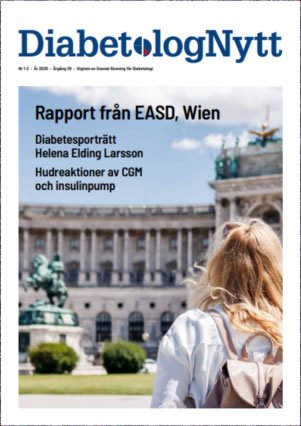Farhågor har funnits att populära diabetesläkemedel som Ozempic kan öka risken för självmord och självskadebeteende. Men enligt en studie vid Karolinska institutet finns ingen tydlig koppling.
Läkemedel med så kallade GLP1-analoger, som sänker blodsockret, är främst avsedda för patienter med diabetes. Men eftersom preparaten även visat sig vara effektiva för att minska fetma används de nu av miljontals människor världen över. Samtidigt har läkemedelsmyndigheter varnat för tänkbara risker.
Risker har utretts
Förra året inledde Europeiska läkemedelsmyndigheten, EMA, en utredning efter att cirka 150 fall av självmordstankar och självskadebeteende rapporterats, och som eventuellt kunde kopplas till diabetesläkemedlen.
Utredningen, som baserades på ett ganska litet underlag, kunde dock inte visa att det fanns ett samband. Bilden bekräftas nu av forskare vid Karolinska institutet som gått igenom större datamängder.
Ingen tydlig koppling
KI-forskarna har tittat på data från cirka 300 000 vuxna personer i Sverige och Danmark. De behandlandes antingen med GLP-1-analoger eller SGLT2-hämmare, som är en annan typ av diabetesmedicin, under åren 2013–2021. Studiedeltagarna följdes upp efter två års tid.
– Vi fann ingen tydlig koppling mellan användandet av läkemedlen och en ökad risk för suicid, självskada eller depression och ångestrelaterade tillstånd. Detta är betryggande, säger Björn Pasternak som är forskare vid Karolinska institutet.
Biverkningar kan skilja sig åt
Men forskarna betonar att fler studier behövs framöver.
– Det är viktigt att specifikt undersöka personer som tidigare haft problem med suicidtankar och självskadebeteenden eftersom de redan befinner sig i riskzonen och läkemedlets biverkningsprofil skulle kunna vara annorlunda i den gruppen, säger Peter Ueda, forskare vid Karolinska institutet.
Vetenskaplig studie:
GLP-1 receptor agonists and risk of suicide death: nationwide cohort study in Sweden and Denmark, Jama Internal Medicine.
Press release www.forskning,se
_____________________________
LÄS HELA STUDIEN FREE PDF
https://jamanetwork.com/journals/jamainternalmedicine/fullarticle/2823083
GLP-1 Receptor Agonist Use and Risk of Suicide Death
Peter Ueda, MD, PhD1; Jonas Söderling, PhD1; Viktor Wintzell, PhD1; et alHenrik Svanström, PhD1,2; Laura Pazzagli, PhD1; Björn Eliasson, MD, PhD3,4; Mads Melbye, MD, DrMedSci6,7,8,9; Anders Hviid, DrMedSci2,5; Björn Pasternak, MD, PhD1,2
JAMA Intern Med. Published online September 3, 2024. doi:10.1001/jamainternmed.2024.4369
Key Points
Question What is the association between use of glucagon-like peptide-1 (GLP-1) receptor agonists and risk of suicide death in patients treated in routine clinical practice?
Findings In this cohort study of 298 553 adults initiating a GLP-1 receptor agonist or a sodium-glucose cotransporter-2 inhibitor nationwide in Sweden and Denmark, the incidence rate of suicide death was low, and those initiating GLP-1 receptor agonist use did not experience increased risk.
Meaning This study provides reassuring data showing that those initiating GLP-1 receptor agonist use were not at increased risk of suicide death, although the study could not assess small risk increases.
Abstract
Importance Concerns have been raised regarding a link between use of glucagon-like peptide-1 (GLP-1) receptor agonists and increased risk of suicidality and self-harm.
Objective To assess the association between use of GLP-1 receptor agonists and the risk of suicide death in routine clinical practice.
Design, Setting, and Participants This active-comparator new-user cohort study used nationwide register data from Sweden and Denmark from 2013 to 2021. Adults 18 to 84 years old who initiated treatment with GLP-1 receptor agonists or the comparator sodium-glucose cotransporter-2 (SGLT2) inhibitors were included. Data were analyzed from March to June 2024.
Exposure Initiation of treatment with a GLP-1 receptor agonist or SGLT2 inhibitor.
Main Outcomes and Measures The primary outcome was suicide death recorded in the cause of death registers. Secondary outcomes were the composite of suicide death and nonfatal self-harm and the composite of incident depression and anxiety-related disorders. Using propensity score weighting, hazard ratios (HRs) with 95% CIs were calculated separately in the 2 countries and pooled in a meta-analysis.
Results In total, 124 517 adults initiated a GLP-1 receptor agonist and 174 036 initiated an SGLT2 inhibitor; among GLP-1 receptor agonist users, the mean (SD) age was 60 (13) years, and 45% were women. During a mean (SD) follow-up of 2.5 (1.7) years, 77 suicide deaths occurred among users of GLP-1 receptor agonists and 71 suicide deaths occurred among users of SGLT2 inhibitors: weighted incidences were 0.23 vs 0.18 events per 1000 person-years (HR, 1.25; 95% CI, 0.83-1.88), with an absolute difference of 0.05 (95% CI, −0.03 to 0.16) events per 1000 person-years. The HR was 0.83 (95% CI, 0.70-0.97) for suicide death and nonfatal self-harm, and the HR was 1.01 (95% CI, 0.97-1.06) for incident depression and anxiety-related disorders.
Conclusions and Relevance This cohort study, including mostly patients with type 2 diabetes, does not show an association between use of GLP-1 receptor agonists and an increased risk of suicide death, self-harm, or incident depression and anxiety-related disorders. Suicide death among GLP-1 receptor agonist users was rare, and the upper limit of the confidence interval was compatible with an absolute risk increase of no more than 0.16 events per 1000 person-years.
EDITORIAL
”Concerns about an association between glucagon-like peptide-1 (GLP-1) receptor agonists, which are used for treatment of type 2 diabetes and for weight loss, and suicidality were raised following case reports submitted to the US Food and Drug Administration (and the European Medicines Agency.1,2In this issue of JAMA Internal Medicine, 2 articles using very different study designs report data on the risk of GLP-1 receptor agonist initiation and adverse mental health outcomes.
While both studies are reassuring, neither fully answers the question of whether these drugs are safe in those with preexisting mental health problems.”
LÄS HELA STUDIEN FREE PDF
https://jamanetwork.com/journals/jamainternalmedicine/fullarticle/2823083
Nyhetsinfo
www red DiabetologNytt

